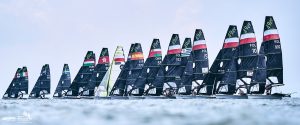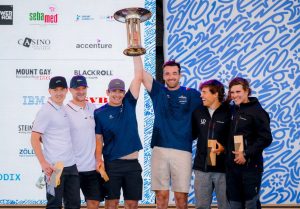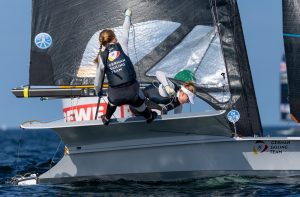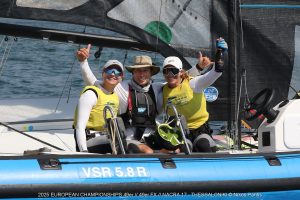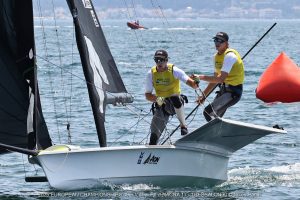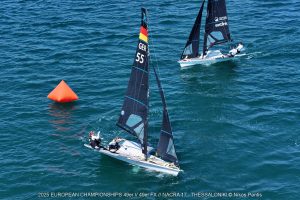Looking back at the 2023 Worlds, there is much to discuss, and one takeaway is medal races are rubbish. Of the six Events using medal races, only one had serious competition for gold on medal race day. Five of the six races were mostly a waste of time from a sporting point of view.
To align with the business model of the IOC and showcase sailing as best we can, we must do better.
Finish with Fleet Racing
The medal race, a single, double-point fleet of the top 10, has proven not to work about half the time. There are some elements of the medal race that are working. If the points are close the racing can be riveting to watch. Direct umpiring means regattas are no longer decided in a jury room. It is pure fleet racing, as ten boats are enough for all elements of fleet racing to be on display. The reasonable number of boats participating should allow broadcast teams to keep up with the complexities of sailing and communicate that to an audience despite unpracticed broadcast teams messing this up fairly often by simply showing the lead boat in any given race.
In a World or European Championship, the final schedule is two gold fleet races and a medal race. The medals are never decided ahead of time, and even if a team has a sizeable lead, there are enough points remaining up for grabs, and enough racing left to do, so the championship will not be decided.
As such, we could simply finish the championship with a normal day of racing, meaning 3 gold fleet or Olympic fleet races, fully umpired. While a team might win before the final race, at least the regatta winning race would be broadcast for sailing fans could witness.
There are two main challenges to this proposal. Firstly, can the umpire team keep up? Updated technology can help allow an umpiring team to adequately referee a gold fleet or Olympic-size fleet using a combination of tracking data, remote communication, and on-water confirmation. Sail GP, the America’s Cup, and the TP52 circuit have been pioneering direct umpiring in fleet racing and the technology is gaining maturity. Whether it can be done to an Olympic standard with an Olympic-sized fleet must be proven, but the likely answer is yes, providing enough technology is used and the umpire team is practiced.
The second challenge is around the cost of the broadcast and the duration of racing. Three 30-minute races typically take 2 hours and 20 minutes to complete, providing the weather behaves. That might not prove to be the most exciting experience for the viewer, nor affordable for the broadcasters. Even within the normal 49er and Nacra 17 regatta setup, the 49er, FX, and Nacra 17 fleets would need to split up final days to ensure a suitable window for racing and resources are available for each of the three Events to get its finish.
Therefore, we propose to optimize the final day and retain what we want. While it’s possible to win a regatta by two races, it is unlikely and rarely occurs. As such, we could move to two races on the final day, each with the full fleet. This roughly doubles the number of points available on the final day from the current medal race day. We can also shorten the races to 20-25 minutes, thus saving time on the broadcast. So long as there is a tight window between the races, there is no reason each Event couldn’t be done in about one hour, or three hours for the three fleets in question. We should ensure none of the races can be dropped, to avoid unnecessary complications, and otherwise, it seems reasonable as a proposal from a broadcasting point of view that all but guarantees the gold medal-winning moment will be broadcast.
Proposal – 2 X gold fleet/Olympic fleet races, 20 minutes each, umpired, no drops.

